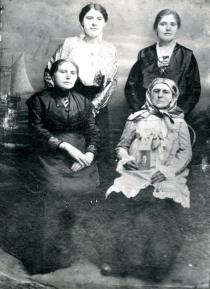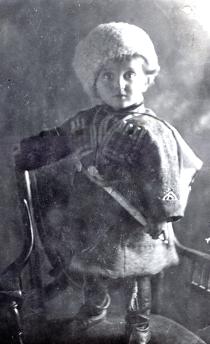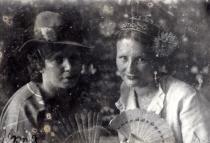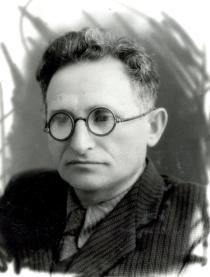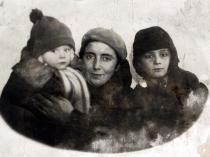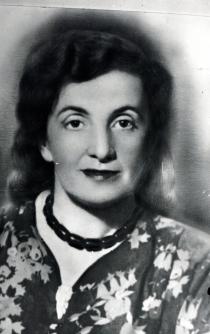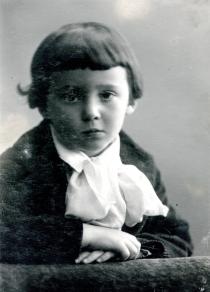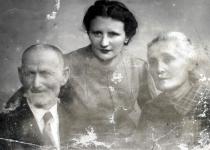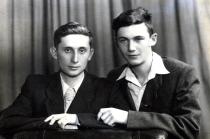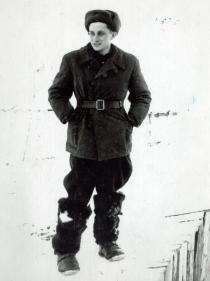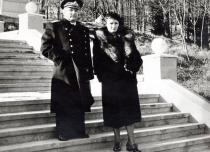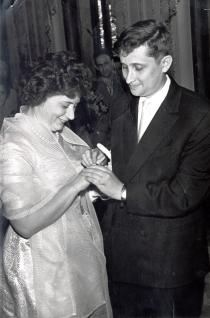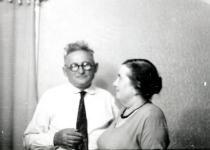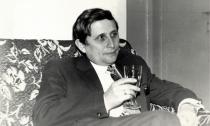My father Grigory Golub in a photo taken Kiev in 1935.
My father was the middle son. He was born in Ladyzhin in 1895. My father read a lot when he was a child. He read with an oil lamp that affected his eyesight. He developed shortsightedness and wore glasses for the rest of his life. Father studied at cheder. He didn't get any special education. From an early age, my father helped my grandfather in his business. I know that he obtained all the necessary documents to move to Palestine in 1914, but he didn't leave because World War I began. During the war my father worked at a road construction site. He had a subcontract for road construction at the border with Romania. He hired workers and administered the work. My grandfather was also awarded a wood cutting contract in Belorussia and my father went there to make all the necessary arrangements.
In 1920 the Polish army occupied Ukraine and Belorussia, and the town of Elsk near Mozyr where my father was working was also under occupation. He moved to Lenino where grandfather's family was living. I don't know what my father was doing during this period. According to the peace agreement with Poland Lenino came under Polish rule and Ladyzhin remained in Russia. My father decided to return home and he had to cross the border in the vicinity of Slavuta illegally. In the mid-1920s he met Emmanuil Odelskiy, an engineer who owned a design office and designed sanitary engineering systems. My father learned this business from him and hired a crew to install these systems. The Vodotopstroy Company was established at this time, and my father became a supervisor in the sanitary engineering department. He did most of the work in Belorussia.
On 29th September 1937 my father was arrested. [Editor's note: This happened at the time of the so-called Great Terror.] I remember the search that lasted a whole night. The policemen took father away in the morning. They also took my mother's younger brother's stamp album, books by Sholem Aleichem, and a book about the Belomorcanal. [This was one of the construction sites of the Stalinist epoch. Thousands of prisoners were involved in the construction of this canal.] They made a list of all the valuables to be confiscated, if required, and left it with my mother. I became the son of an 'enemy of the people'. I can't say that the attitude towards me changed - I wasn't the first or the last in my class to have his father arrested.
In prison my father was accused of espionage for Poland. During the investigation my father confessed to crossing the border, but rejected the charge of espionage. In his file there is a report of his co-prisoner stating that my father made counterrevolutionary statements in the cell, was negative about the term of 25 years of imprisonment that had been introduced before, and told stories from ancient Jewish history. This was made a basis for the additional accusations of counterrevolutionary propaganda in the cell, and of preaching Zionism. In the verdict issued by a special meeting of the NKVD representatives, he was accused of counterrevolutionary activities and sentenced to 10 years imprisonment in a special prison camp. The verdict was issued on 2nd November 1937. One was not allowed to write letters to or visit the prisoners. One was only allowed to take parcels containing cigarettes and dried bread to the jail.
My father was sent to Ivdellag in the north of the Middle Ural. He became a head of the sanitary engineering department there. He was free to go to the neighboring village without any escort. My mother, Uncle Yankel and Aunt Riva visited him before the war. In February 1938 his management solicited for a 2-year reduction of his term in prison. My mother and father also sent requests to have his term reduced, but these were not successful. In 1944 there was an accidental explosion in the boiler facility of the camp. My father had nothing to do with it. It was the fault of the drunken operator, but my father was accused, and 5 years were added to his term of imprisonment. Later, my father managed to get released due to his poor health condition. He was allowed to live in Irpen - Kiev and other bigger cities were forbidden to ex-prisoners. The authorities decided on where the prisoners should reside after they were released from jail.
My father died in Kiev in 1983.

